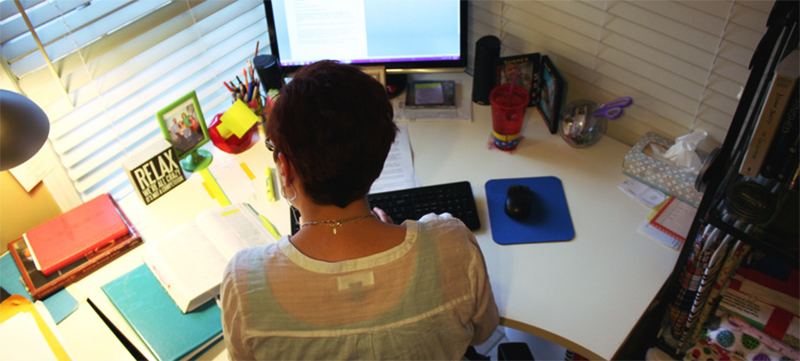I met Laura Beth Martin at a writers’ conference in Portland this spring. She had already been in the Clumsy Bloggers’ Workshop for a few weeks, and told me about the 30 Days of Writing it had inspired. I made her promise to tell me how it turned out for her, when she had finished. Here’s what she discovered:
The assignment was pretty clear-cut, and I was pretty sure I didn’t want to do it.
“To be successful in writing consistently you need to set a goal. Now, think about how you’re going to reach that goal. Make an appointment with yourself. Be as specific as possible.” – Micah J. Murray
I really wanted to skip that part of Lesson 2 from the Clumsy Blogger’s Workshop. Nothing in me was excited about the thought of being obedient. I was much better at listening to the gremlins in my head convince me of my inability:
“You aren’t a real writer. Why are you even bothering? No one reads your work, no one. You can’t write a book. Who are you kidding? You are a pharmacist, go back to the counter and answer the phone. That’s where you belong.”
Trouble was, I paid for this course so part of me felt obligated to the money. I couldn’t see paying the money and then not doing the work; it seemed wasteful and somehow wrong. Plus, I’m no quitter; it isn’t in my nature.
So I threw around the number of words I would write each day ,as if I was deciding how much torture I could endure in one sitting; 250 words seemed too small, 1000 seemed ridiculous and impossible. So I settled on 500 words per day for one month written straight through with no editing or analyzing as I wrote. I was going to turn the faucet of words on full blast with no regulator, no judging myself, no holding back. That was the only rule and everything else was fair game, any subject, any topic, and any genre was allowed.
And write I did. I wrote exactly 17,231 words in thirty days.
You might not believe it; I wouldn’t have if you had whispered it in my ear on day one. But I did, and you can too.
Here’s the inside track on how I achieved my goal and found the audacity to tell people I am a writer.
1. Try out your goal before fully committing.
I batted it around the middle part of March mostly writing every other day, knowing I hadn’t set a real start date. This was good for me because it let me try on 500 words and see how it fit. Turns out it fit pretty dang good. To my surprise I discovered I could write 500 words; it was doable, and I needed doable. If my everyday goal had been too large I would have been discouraged and possibly quit. Those 2 weeks of trying it out gave me confidence to jump into a whole 30 days.
2. Set a start date and stick to it.
I set April 1st as my start date and leapt right in without considering anything, like, I don’t know my schedule. I had two out-of-town trips that month and my life was thrown into disarray. I got really sick and suddenly every day was lived in pain & fear. The kids started softball & t-ball too so between working ten hour shifts and everyone’s crazy hours we never seemed to be at home (where my computer resides.) Most days I wanted to quit the project and start over when life seemed easier …. but I discovered you can’t wait for circumstances to be perfect to write. The stars will never align long enough for that to happen. I quickly learned to write whenever and wherever I could. Perhaps for you, setting a certain time will work better but for me it didn’t. I grabbed minutes at every opportunity I found and I encourage you to do the same.
3. Learn to use tools and technology like a boss.
I carried my iPad, phone, a notebook, or a journal with me everywhere I went. Everywhere. I stopped being afraid to use multiple platforms and decided that if I was going to reach my goal I would use any means necessary. I used apps like Evernote and Notes on my phone. Evernote will let you write or even speak your ideas and I found out that me talking for about 5 minutes is more than 500 words, imagine that.
4. Create an idea list.
Write down every thought or idea you have — all of them, everyday. Even if you aren’t sure it is worth writing about, write it down anyway. Three days later you may have more to say about the subject. One of my biggest fears has always been running out of material or not knowing what to write about and this advice shattered that fear to the far corners of the earth. Suddenly I had more ideas than I had time to do justice to and so can you.
5. Learn to walk away from a piece.
There will be times when the words aren’t showing up or working; they are just not flowing. Shut down and walk away if necessary. Take a break if that’s a possibility; if no,t then start over. On several occasions it was almost the end of the day but I only had 253 words and nothing else to say on that subject. I would save the page, take a deep breath, open a new document, select a topic from my idea book and start over. It stunk to start over at 11:40pm on a Wednesday when I had already worked myself to near exhaustion at my day job, but it can be done. I’m living proof that starting over isn’t equivalent to failure.
4. Realize that no one has to see your first draft.
I learned to write about everything and anything with the filter of my mind off because no one has to see your crappy first draft. Seriously, no one ever has to see it. There is an amazing freedom for writers in understanding this concept. It not only throws open the doors to our feelings and creativity, but it also shoves in the doorstops so they stay wide open. Step into that freedom with wild abandon.
5. You have to work the work.
To be a writer you must write; there is simply no way around it. Your ideas are not going to magically put themselves onto the page. You’ve got to produce a large volume of work to have something to edit later; it is essential. You can’t always be making excuses for why you aren’t doing the work you know you should be doing. At some point you have to show up with your muck boots on and say, “This is it, I’m going to do the work.”
6. You have to decide that your stories and your words are important.
About two weeks into the assignment I was convinced that I was utterly failing. I was doing my words everyday but I just knew all the work I was producing was crap. I believed I was wasting a colossal amount of time and energy. So halfway around day fifteen I spent some time reading straight through my first drafts with no editing, correcting, or improving. Turns out I was dead wrong.
They weren’t awful. They were raw and sometimes disorganized but I could see beauty there. I could see progress. I could see my stories unfolding into the light. And I felt empowered in a way I had never been before. I discovered I was strong enough to write my words. I was bold enough to say, “Here are my thoughts and beliefs, they are real and they are valuable, therefore, so am I.” On day fifteen I decided my words were important — if not to anyone else, then to myself. And that was enough. It truly was.
When my thirty days of writing ended I spent five minutes totaling up my words and there were 17,231. Never have I written so many words in such a short period of time.
I’m really grateful for writers like Micah who create tools like the Clumsy Blogger’s Workshop to help those of us who struggle with the belief in our ability to tell the stories living within us. Working through my writing challenge turned out to be more than a task, more than something I checked off my to do list, it taught me that my commitment to my work is worth it.
It taught me that I am a writer.

Laura loves food and people, not necessarily in that order. She is a wife, mother, pharmacist, clumsy blogger, recovering people-pleaser, and writer. Head over to her blog and make sure to connect with her on Facebook and Twitter too!
Ready to join the Clumsy Bloggers’ Workshop? Check out Lesson 1 for free, and then use promo code “SUMMER2015” for 30% off enrollment.
published July 21, 2015
subscribe to updates:
(it's pretty much the only way to stay in touch with me these days)

